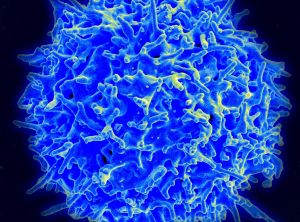Las vacunas tienen como objetivo preparar al sistema inmunitario frente al virus que provoca la COVID-19, explican los investigadores. El efecto protector de estas vacunas se genera gracias a lo que se denomina memoria inmunológica. Hasta hace muy pocos años se creía que la inmunidad específica (adaptativa) era la única que poseía memoria (capacidad de ‘recordar’ patógenos previos –virus, bacterias, entre otros- y desencadenar la respuesta para defender el organismo), mientras que la inmunidad innata (no específica para un patógeno concreto) no la tenía. “Hoy se sabe que se puede ‘entrenar’ la inmunidad innata para conseguir una mejor respuesta frente a infecciones posteriores no relacionadas. Por ejemplo, entrenar la inmunidad innata con preparados bacterianos para proteger frente a infecciones virales, como SARS-CoV-2. Además, dicho entrenamiento perdura en el tiempo”, explica David Sancho.
Los investigadores han evaluado si esta inmunoterapia, aplicada de modo previo a la administración de las vacunas, podría mejorar las respuestas inmunitarias generadas por vacunas contra la COVID-19. Para ello, en experimentos realizados en el CNIC, inocularon en ratones tratados o no tratados con MV130 dos tipos diferentes de vacunas: una basada en la vacuna del CSIC llamada MVA-CoV2-S (generada por el grupo de los Dres. García Arriaza y Esteban) y otra basada en proteína S recombinante con adyuvante, que fueron administradas por dos rutas diferentes, con una inyección intramuscular o a través de la mucosa nasal.
“El resultado obtenido reveló que aquellos animales que recibían MV130 de modo previo a la vacunación y, por tanto, tenían el sistema inmunitario innato entrenado mostraban mejores respuestas inmunitarias tras la vacunación”, señala Carlos del Fresno. En concreto, añade, “MV130 aumentaba la activación de las células T CD8 citotóxicas, encargadas de eliminar las células infectadas, así como los niveles de anticuerpos IgA frente a la proteína S del SARS-CoV-2 en las mucosas”.
Protección frente a mortalidad
Este trabajo demuestra, recalca Juan García Arriaza, “que la inmunoterapia con MV130 protege de manera directa contra la mortalidad por coronavirus SARS-CoV-2 y, por otro lado, favorece una inmunidad innata entrenada que ayuda a mejorar las respuestas inmunitarias generadas por las vacunas contra la COVID-19”.
“Se trata de unos resultados relevantes que indican que, en el caso de futuras nuevas infecciones causadas por patógenos emergentes, la inmunoterapia con MV130 podría proteger a grupos particularmente sensibles al patógeno hasta la llegada de vacunas específicas frente a antígenos asociados al patógeno”, destaca Mariano Esteban.
Asimismo, comenta el Dr. Sancho, “hemos colaborado en un ensayo clínico en el que se demostró efectividad de MV130 en protección frente a infecciones respiratorias recurrentes en niños, que epidemiológicamente son de etiología vírica”. Este ensayo se publicó en American Journal of Respiratory and Critical Care Medicine, la revista internacional más prestigiosa de neumología y cuidados intensivos.
Estos resultados, concluyen los investigadores, demuestran que la utilización de MV130 como inmunoterapia permitiría mejorar la eficacia e inmunogenicidad de las vacunas, particularmente en ciertos segmentos de población o frente a variantes del patógeno que puedan reducir la eficacia de la vacuna, contribuyendo a una mejor protección de la población contra la COVID-19.
Este proyecto ha sido posible gracias a la financiación del “Fondo Solidario Juntos” del Banco Santander al proyecto del Dr. David Sancho en el CNIC y al “Fondo COVID-19” del Instituto de Salud Carlos III (ISCIII) otorgado al Dr. Juan García Arriaza. Otras entidades financiadoras son: Fundación Asociación Española contra el Cáncer (AECC); Fondo Supera COVID-19 (Crue Universidades-Banco Santander); Fundación la ‘Caixa’; Programa Horizonte 2020 y Beca Marie Skłodowska-Curie de la Unión Europea; beca EMBO; Comunidad de Madrid y Fondo Social Europeo y Desarrollo Regional Europeo; Consejo de Investigación Europea (ERC-2016-Consolidator Grant 725091); Agencia Estatal de Investigación (PID2019-108157RB); Comunidad de Madrid; Inmunotek S.L ., y Fundació La Marató de TV3.
Más información
del Fresno C, García-Arriaza J, Martínez-Cano S, Heras-Murillo I, Jarit-Cabanillas A, Amores-Iniesta J, Brandi P, Dunphy G, Suay-Corredera C, Pricolo MR, Vicente N, López-Perrote A, Cabezudo S, González-Corpas A, Llorca O, Alegre-Cebollada J, Garaigorta U, Gastaminza P, Esteban M and Sancho D. The Bacterial Mucosal Immunotherapy MV130 Protects Against SARS-CoV-2 Infection and Improves COVID-19 Vaccine Immunogenicity. Front. Immunol 2021 12:748103. doi: 10.3389/fimmu.2021.748103






